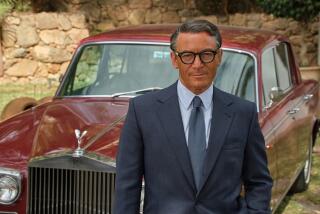PASSINGS: Frank Cady, Don Campbell, Frank Arciero, F. Herbert Bormann
- Share via
Frank Cady
Character actor was on ‘Green Acres’
Frank Cady, 96, a character actor who played Hooterville general store proprietor Sam Drucker on the TV sitcoms “Green Acres” and “Petticoat Junction,” died Friday at his home in Wilsonville, Ore., said his daughter, Catherine Turk. No specific cause was given.
Like Mr. Haney, Eb Dawson, Hank Kimball and Arnold the Pig, Cady’s Sam Drucker was a supporting cast member on “Green Acres” to lawyer Oliver Wendell Douglas and his socialite wife Lisa, played by Eddie Albert and Eva Gabor, who had ditched the high life in New York City for the charms of a farm in Hooterville.
Cady played Drucker for the entire run of “Green Acres” on CBS, from 1965 to 1971, when it was canceled. The show continued to air for years in syndication. He also portrayed Drucker on “Petticoat Junction” and “The Beverly Hillbillies,” programs that shared some secondary characters. He reprised the role for the 1990 TV movie “Return to Green Acres.”
Cady had a recurring role as Doc Williams on “The Adventures of Ozzie and Harriet” and had guest roles in TV series beginning in the early 1950s. He also had small parts in films, most notably Alfred Hitchcock’s “Rear Window,” and appeared in Southern California stage productions.
He was born Sept. 8, 1915, in the Lassen County town of Susanville and studied speech and drama at Stanford University. After serving in the Army Air Forces during World War II, he worked as a radio broadcaster before landing acting jobs.
Cady and his wife, Shirley, moved to Oregon in the ‘90s. She died in 2008.
Reflecting on his TV career, Cady told the Portland Oregonian in 1995, “You get typecast. I’m remembered for those shows and not for some pretty good acting jobs I did other times. I suppose I ought to be grateful for that. Because otherwise I wouldn’t be remembered at all. I’ve got to be one of the luckiest guys in the world.”
Don Campbell
‘Mozart Effect’ author
Don Campbell, 65, an author and entrepreneur whose best-selling books on “The Mozart Effect” helped popularize the notion that listening to the composer’s music could enhance mental and creative abilities, died June 2 of pancreatic cancer in Colorado, according to his publicist.
His theories grew out of a scientific study at UC Irvine in the early 1990s that found listening to Mozart briefly boosted undergraduates’ spatial reasoning. Later researchers were largely skeptical of the results but some credited “The Mozart Effect” — a term Campbell trademarked — with bringing wider attention to the cognitive benefits of music.
He argued his case in the 1997 best-selling book “The Mozart Effect” and a subsequent book, “The Mozart Effect for Children” (2000), which prescribed different pieces of classical music for various stages of a child’s growth.
The music of Mozart was particularly effective, he told Australia’s Sydney Morning Herald in 2001, because of “the tidiness of his form. Mozart is not overemotional; he doesn’t surprise you.”
In a 2010 article that examined his theory, the Los Angeles Times noted that Campbell had been dubbed the “P.T. Barnum of the Mozart Effect” and observed: “Campbell’s sales pitch melds seemingly scientific claims with breathless hype.”
A native of San Antonio, Texas, Campbell was classically trained in piano. As a teenager, he studied at a conservatory in France.
In 1988, he founded the Institute of Music, Health and Education in Boulder, Colo., and served as its director until 1997. He wrote more than 20 books, mainly about the health benefits of music, and built a thriving online business selling CDs with such names as “Mozart to Go.”
Frank Arciero
Developer and motor sports figure
Frank Arciero, 86, an Irvine-based real estate developer and pioneering presence in U.S. motor sports, died May 23, his family announced. Arciero, who resided in Laguna Beach, had an aneurysm two months ago and died at an Orange County hospital.
After watching a race in 1954 in Palm Springs, Arciero bought a Ferrari and started racing but turned to building teams when an insurance agent pointed out that Arciero was putting his life at risk.
His teams included such Indianapolis 500 legends as Al and Bobby Unser, Parnelli Jones, Michael Andretti and Roger Penske. Two of Arciero’s drivers were named rookie of the year at the Indy 500, Randy Lanier in 1986 and Fabrizio Barbazza in 1987. Arcierio’s sons, Frank and Albert Arciero, are top off-road drivers, and grandson Ryan Arciero is a championship-winning driver.
Born in Italy, Arciero immigrated to the U.S. in his early teens with his brother Philip and eventually moved to Southern California. The brothers did manual labor before establishing a cement subcontracting business that made them a fortune.
“The postwar boom was on, and I was there,” Arciero told The Times in 1983. “I expanded from driveways and garages to supermarket foundations; then I landed a contract to build a sea wall at Huntington Harbor.”
The brothers reportedly built parking garages at Los Angeles International Airport, buildings at Cal State Fullerton and subterranean garages at Bunker Hill. They also built much of Diamond Bar and by the early 1980s were building about 200 tract homes a year in such places as Palm Springs and Calabasas.
On his way to a race, Arciero came upon Paso Robles and in 1985 established Arciero Winery on Highway 46 near the town. It became one of the region’s top wine producers but struggled before being rebranded as Eos, for the Greek goddess of dawn. The winery was sold for an estimated $35 million in 2007.
F. Herbert Bormann
He helped discover acid rain
F. Herbert Bormann, 90, one of three Dartmouth College geology professors who helped discover acid rain, died Thursday in North Branford, Conn. With colleagues Noye Monroe Johnson and Gene Likens, Bormann analyzed drainage from watersheds and discovered high levels of sulfates. They concluded the chemical came from the atmosphere via a phenomenon they called acid rain. Bormann was a Yale University professor from 1966 to 1992.
-- Times staff and wire reports
More to Read
Start your day right
Sign up for Essential California for the L.A. Times biggest news, features and recommendations in your inbox six days a week.
You may occasionally receive promotional content from the Los Angeles Times.



















































